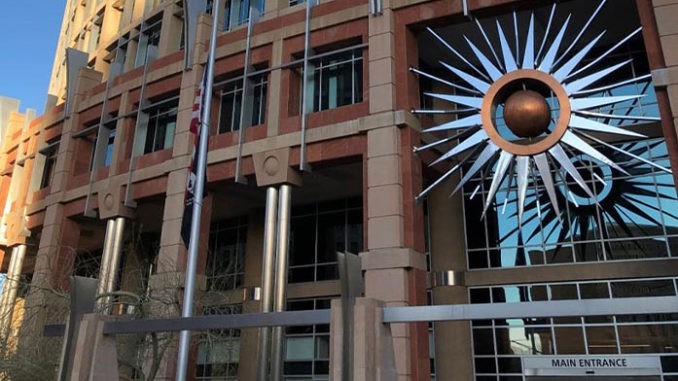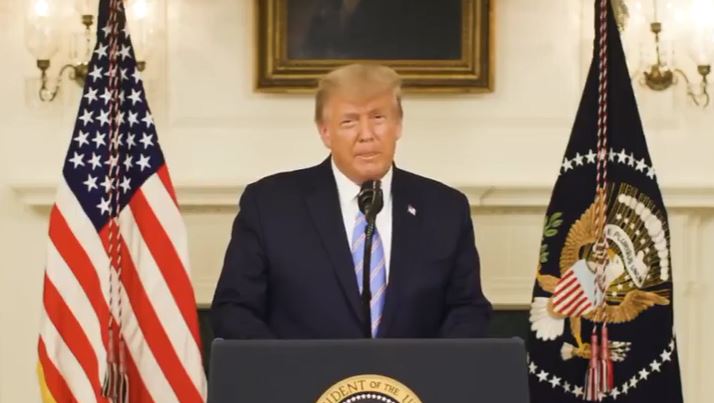
by Corinne Murdock | Apr 2, 2023 | News
By Corinne Murdock |
An Arizona legislator informed his constituents that he wouldn’t be caving to their demands for supporting gun control legislation. The call to action has mainly come from left-leaning groups and activists in the wake of the Covenant School shooting in Nashville, Tennessee that left three young children and three adults dead.
State Rep. John Gillette (R-LD30) announced his intent in a letter issued Thursday. Gillette advised his constituents, at length, for his rationale for not supporting greater gun control: criminals can work around gun control measures to obtain weapons, citing the Nashville shooter lied on her background check to obtain guns; FBI data shows no correlation between gun control and crime reduction; and that crime generally correlates with law enforcement procedures and economic factors.
“Controlling a physical object has zero effect on human behavior,” said Gillette. “Laws are followed by law-abiding citizens, not criminals and not people who suffer from mental illness.”
Gillette further noted that no National Rifle Association (NRA) member, licensed firearms dealer, or “right-wing” activist had committed a mass shooting.
“These murders were committed by mentally unstable left-leaning adults that were known to law enforcement or mental health professionals or both,” said Gillette.
Gillette disclosed that he would be open to legislation imposing the death penalty on those who commit a mass shooting, as well as legislation imposing civil penalties on any agency or licensee that failed to report or act on a credible threat.
Gillette also pointed out that FBI data hasn’t been updated for the last eight quarters — since 2021.
Following the shooting, Democratic legislators and activists called for stricter gun control.
State Sen. Anna Hernandez (D-LD24) claimed that the shooting occurred because guns have more rights than individuals.
“Instead of finding solutions to end gun violence we continue to see legislation across the nation that grants more rights and protections to guns rather than legislation to mitigate the loss of human life to mass shootings and other gun violence,” said Hernandez.
State Rep. Laura Terech (D-LD04) used the tragedy to promote her legislation barring school blueprints and floor plans from being publicly available.
“The senseless act of violence in Nashville further shows the need for sensible policy to keep our children safe from gun violence,” tweeted Terech. “My bill #HB2075 will keep school blueprints and floorplans [sic] from public view.”
State Rep. Nancy Gutierrez (D-LD18) also promoted Terech’s bill, and said that the deaths were proof that guns were the cause of the school shooting. It has been widely reported that the shooter — a 28-year-old woman that struggled with gender identity issues — had a manifesto which outlines the reason for her killing spree. The manifesto remains unpublished.
“The shooting in Nashville is another failure of the US to stop our gun problem,” stated Gutierrez.
State Rep. Leezah Sun (D-LD22) blamed those opposing stricter gun control for the deaths.
“We cannot keep letting our children die while we fail to pass gun control on the basis of ‘political differences,’” said Sun.
Corinne Murdock is a reporter for AZ Free News. Follow her latest on Twitter, or email tips to corinne@azfreenews.com.

by Terri Jo Neff | Apr 1, 2023 | Economy, News
By Terri Jo Neff |
An Arizona company has announced plans to ship African-mined cobalt to Mexico, then truck it north to be processed at a new, state-of-the-art facility in Yuma County so it can be sold to companies that make batteries for Electric Vehicles (EVs).
EVelution Energy is expected to start construction of its Yuma cobalt processing facility next year, with a goal of being operational no later than early 2026. It forecasts more than 1,000 construction phase jobs, along with 60 direct and 300 indirect jobs once the facility is fully functional.
Cobalt is a rare, ferromagnetic metal primarily used in lithium-ion batteries and in the manufacture of magnetic, high-strength alloys. Dating back to 3000 BC, cobalt was mostly used for its blue coloring in the making of ceramics and glass.
Other uses were limited due to the fact arsenic fumes are a by-product of smelting. But new processing methods in the last few decades changed all of that.
In March, the Yuma County Board of Supervisors unanimously approved a special-use permit allowing EVelution to move forward with construction on 139 acres just east of the City of Yuma and south of the Kofa National Wildlife Refuge.
The property, which spans Union Pacific Railroad tracks and U.S. Interstate 8, is located within one of Arizona’s Qualified Opportunity Zones which provide a wide range of tax incentives for private, long-term investments in economically distressed communities.
There are also various federal economic development incentives currently available for EVelution Energy’s project, such as the Inflation Reduction Act and the Infrastructure Investment and Jobs Act.
According to the U.S. Geological Survey, nearly two-thirds of all mined cobalt (150,000 tonnes in 2019) comes from the Democratic Republic of the Congo (100,000 tonnes in 2019). The USGS also estimates there is about 4 million tonnes of cobalt reserves on the African continent, and another 3 million tonnes globally.
EVelution plans to transport cobalt hydroxide feedstock sourced from the Democratic Republic of the Congo to a port in Ensenada, Mexico, a roughly four hour trip by truck to the Yuma processing facility. And the company knows there is domestic market for its product.
Currently, more than 70 percent of the world’s battery grade cobalt is processed in China. That puts U.S.-based Electric Vehicle manufacturers overly reliant on imports.
The Yuma cobalt facility’s expected annual 7,000 tonnes capacity could meet 40 percent of the expected demand for U.S.-produced EVs in 2027.
The forecasted $55 million economic benefit from EVelution Energy’s project is very much needed, particularly in southwestern Arizona. However, two environmental concerns will be closely monitored even though Yuma County approved the company’s special use permit.
First is the sourcing and disposal of water. EVelution expects to use 74 million gallons of water per month. The water will be sourced from aquifers running under the property, likely via wells which will run more than 1,000 feet deep.
“Our water usage is therefore not expected to impact the surrounding area’s water table/groundwater,” the company says, adding that a water treatment plant will allow for about 70 percent of its used water to be recycled.
The second concern is the disposal of “tailings,” which are the unused materials which remain after processing. EVelution intends to minimize risks of potential contamination to its or surrounding land by foregoing on-site tailing ponds.
“Tailings will be collected, transported and safely disposed of at a licensed local landfill located less than 20 miles away,” the company says.
EVelution Energy is also focused on transitioning to a net zero carbon future. Getting there will mean building a 38.4 MW (peak) solar power array to power the processing plant. The company expects to use excess power from the day to recharge its battery storage.
There is also the possibility some of the excess electricity can be sold to a local power utility to service nearby agricultural companies.
“Solar power will heat the water and process solutions for hydrometallurgical cobalt processing,” according to the company’s website. ‘This heated solution will be stored at temperature in large storage tanks overnight. Using solar power rather than propane or natural gas will further reduce our carbon-footprint.”
As with most mining operations in Africa, there are concerns with the health impacts to workers and with the use of child labor. EVelution’s website shows the company is aware of those issues.
“We are committed to sourcing cobalt in a socially responsible manner, preventing child labor and to promoting respect for human rights of people employed in or affected by our cobalt supply chain,” the website states. “We plan to source our cobalt only from companies that comply with the guidelines of the Responsible Cobalt Initiative.”
EVelution’s proximity to California could lead to further revenue streams, given that state’s early acceptance of EVs.
With EV batteries being quite heavy, and thus expensive to transport, the company is “well positioned to potentially recycle EV batteries from electric vehicles that reach the end of their product lifespan,” its website notes. “The oldest electric vehicles are predominantly located in California and therefore their batteries will be in need of recycling the soonest.”
Terri Jo Neff is a reporter for AZ Free News. Follow her latest on Twitter, or send her news tips here.

by Corinne Murdock | Apr 1, 2023 | News
By Corinne Murdock |
On Thursday, Phoenix had the grand opening of a $12 million community center, days after a court ruled that it had refused to clean up the massive homeless encampment downtown.
Phoenix Mayor Kate Gallego announced the 34,000-square-foot community center, noting that she’d been working on the project since her election in 2019. That was the same year that the homeless crisis began.
Funding for the community center came from the Parks and Preserve Initiative, which sets aside one cent of sales tax for every $10 spent to improve and renovate parks, as well as to expand and improve the city’s desert preserve system.
As AZ Free News reported in its investigative series on The Zone, the homeless crisis has a devastating impact on Phoenix’s ground and waterways.
The community center is located about eight miles south of the homeless encampment (The Zone). It has an elevated track, basketball court, kitchen, fitness center, gaming room, outdoor movie theater, art installation, and a sensory room.
The city opened the community center a day before the holiday celebrating its namesake: the civil rights and union activist Cesar Chavez.
During the grand opening ceremony, Gallego called the community center a “showpiece” that represents city values. Gallego disclosed that the city had to jump through a lot of hoops to find the funding to finish the project.
“We put inclusivity at the forefront. This building really shows our values,” said Gallego. “[W]e really had to work as a team to find out how to fund this project. Most city projects have fairly simple funding resources, but this one was quite complex with bond funding, impact fees, [and] a little bit of federal funding.”
The city held its groundbreaking for the community center in September 2020. That was eight months after the residents and business owners within The Zone, the massive homeless encampment downtown, presented a plan to mitigate the burgeoning homeless with outdoor shelter or camping spaces on city land. According to the Maricopa County Superior Court ruling, the city generally ignored their pleas and their plans.
The Maricopa County Superior Court ruled on Monday that the city of Phoenix was at fault for the homeless crisis, which began around 2019 after the city essentially stopped enforcing laws on the homeless.
The city initially projected the community center to be completed last spring or early summer. It’s the city’s first community center established since 2007.
Corinne Murdock is a reporter for AZ Free News. Follow her latest on Twitter, or email tips to corinne@azfreenews.com.

by Daniel Stefanski | Apr 1, 2023 | News
By Daniel Stefanski |
A push to protect Arizonans’ constitutional liberties for future health emergencies hit a dead end after clearing both chambers of the Arizona Legislature.
This week, Democrat Governor Katie Hobbs vetoed SB 1250, which dealt with vaccine requirements and religious exemptions to those mandated medical shots. The governor’s veto was her 20th of the legislative session.
In a letter to President Warren Petersen on Thursday, the governor explained her reasoning for rejecting the legislature’s proposal: “This bill is unnecessary, as legal protections for an employee’s religious beliefs already exist in federal employment law. This bill also threatens employers with a civil penalty and a hefty fine, which could be devastating for Arizona’s many small businesses.”
Hobbs encouraged legislative leaders to “work to find bipartisan solutions that promote the educated and healthy workforce that is essential for Arizona’s economy.”
Senator Janae Shamp, the bill’s sponsor, was not pleased with the governor’s action, releasing the following statement in response: “I spent my entire career as a nurse, being an advocate for my patients and ensuring that their beliefs are respected and protected. The reason I’m here at the Senate, is because I was fired from my job as a nurse after refusing to get the experimental COVID-19 vaccine. My top priority is this bill because during the pandemic, Americans’ medical freedoms were taken from them, myself included. For me, the Governor’s veto is personal. Not just for me but for every Arizonan who lost their job in the same manner.”
Shamp also addressed the governor’s call for bipartisan solutions, saying, “To call out those who stood to protect our health from an experimental shot that is proving to be toxic for many, is beyond an insult. If we truly care about our healthcare and getting people back to work, then maybe we should come together to get nurses back into our hospitals.”
The senator promised “to continue to fight for Arizonans’ medical freedom.”
On Twitter, Senator Shamp went further, calling Governor Hobbs “an open medical tyrant.”
SB 1250 instituted these main provisions (among others) for state law:
– “Requires employers to allow employees that complete a religious exemption form to opt out of vaccination requirements for COVID-19, influenza A, influenza B, flu or any vaccine authorized by the U.S. Food and Drug Administration for emergency use only.”
– “Prohibits employers from discriminating against an employee regarding employment, wages or benefits based on vaccination status; and from inquiring into the veracity of an employee’s religious beliefs practices or observances to the extent beyond what is allowed under federal law.”
– “Allows a terminated employee who was not offered or was denied a vaccination religious exemption by their employer to file a complaint with the Attorney General.”
This legislation closely tracked an opinion request from former Senator Kelly Townsend to former Attorney General Mark Brnovich, which was answered on August 20, 2021. Townsend asked three questions, including whether an employer could require a COVID-19 vaccine as a condition of employment. Brnovich, who had several lawsuits over federal COVID-19 vaccine mandates (including the first one in the nation that was filed in Brnovich v. Biden), found that “under federal and state law, employers who mandate vaccinations must provide reasonable accommodations to employees who cannot obtain the COVID-19 vaccine due to a disability or a sincerely-held religious belief.”
Brnovich’s opinion also outlined that “a sincerely-held religious belief about receiving a COVID-19 vaccine includes a moral or ethical belief against receiving a COVID-19 vaccine that has the strength of a traditional religious view.” On the 2022 campaign trail, current Attorney General Kris Mayes was asked about forced vaccine mandates by private businesses and responded, “Of course they can. It is a private business.”
Daniel Stefanski is a reporter for AZ Free News. You can send him news tips using this link.

by Daniel Stefanski | Mar 31, 2023 | News
By Daniel Stefanski |
After days of anticipation, a former American president was indicted by a New York City grand jury, sparking great outrage by Arizona Republicans.
Former President Donald J. Trump, according to reports, was indicted by a New York City grand jury on Thursday. The indictment came days after Trump posted a warning to his Truth Social account that he would soon be arrested despite “no crime being able to be proven and based on an old and fully debunked fairytale.”
The news created a firestorm across the nation – on both sides of the aisle. Arizona, home to some of the most ardent supporters of the former president – was no exception, as lawmakers and party leaders expressed their thoughts on the historic and unprecedented action by a prosecutor against a former leader of the free world and current frontrunner for President of the United States.
Kari Lake, the 2022 Republican nominee for Arizona Governor, released a statement condemning the indictment, writing: “This is a dark moment in the history of our nation. The radical left and their weaponized criminal justice system have crossed all legal and ethical lines in an attempt to destroy President Donald J. Trump. Jailing your political opponents based on politically-motivated grievances is something you’d expect to see out of third-world dictatorships or banana republics. But now, after a years-long assault on our Constitution, the radical left has accelerated this country’s descent into a broken system that allows for the political persecution of ANYONE who threatens the status quo.”
Representative Austin Smith tweeted, “I stand with President Trump.”
Smith later added, “The American left has fully embraced Bolshevism now with no apologies There is no going back from this.”
Representative John Gillette stated, “This has already been to trial. Stormy lost and had to pay Trump $300,000, her lawyer, Avanati was convicted and sent to prison for fraud. The Democrat machine and the Soros funded AG, used his office for politics. He just assured that Trump supporters will come out strongly!
Representative Alex Kolodin challenged his colleagues to use the breaking news to push legislation that would hinder these prosecutorial actions, saying, “Reminder, my fellow Freedom Caucus members and I are running a bill to prohibit political prosecutions – the time is now!”
Kolodin’s pitch to fellow legislators attracted the attention of Senator Justine Wadsack, who endorsed his comments” “I’m proud to work with @realAlexKolodin on our bill #SB1418 that passed out of the Senate and House Government committee. The timing for the need of such a bill is ironic with the indictment of Donald Trump.”
Senator Jake Hoffman, the Chairman of the Arizona Freedom Caucus, said, “The indictment of President Trump by this Soros-backed prosecutor is the most disgusting weaponization of the justice system in our nation’s history.”
Senator Anthony Kern tweeted, “I stand with the best America First President @realDonaldTrump!
Representative Rachel Jones wrote, “President Trump once said, ‘They’re not after me. They’re after you. I’m just in the way.’ I stand with this man!”
Senator Wendy Rogers, one of Trump’s top allies in the state, echoed what many of her colleagues had been releasing throughout the day, tweeting, “We stand with @realDonaldTrump.”
The Arizona Senate Democrats Caucus appeared to mock Republicans standing with the former President – specifically Representative Smith, tweeting, “ *makes note* Arizona Freedom Caucus is standing with the President who paid hush money to a porn star while married.”
Smith had the last word with this exchange, firing back: “ *makes note* Arizona Senate Democrats ok with third world country tactics”
The Arizona Senate Democrats Caucus unsurprisingly had a different perspective on the day’s events, stating, “Big list of ‘firsts’ from Donald Trump: – First President to face criminal charges. – First President to lead an insurrection on our Capitol (joined by a current Arizona Republican State Senator). – First President that led an active charge to overturn our elections.”
Daniel Stefanski is a reporter for AZ Free News. You can send him news tips using this link.

by Corinne Murdock | Mar 31, 2023 | News
By Corinne Murdock |
A bill from Rep. Paul Gosar (R-AZ-09) to end the COVID-19 National Emergency Declaration passed the Senate on Wednesday.
The legislation now heads to President Joe Biden for his signature. The resolution, HJR 7, was first filed in January. It received bipartisan support: 68 senators voted for the resolution, with 23 against. Both Sens. Mark Kelly and Kyrsten Sinema voted for it.
“Looking forward to Joe Biden signing this to finally end this national nightmare,” tweeted Gosar.
Biden won’t veto the measure — meaning that the end of the emergency could come more quickly than anticipated. The Biden administration promised to end the emergency declaration on May 11.
The president’s goodwill on a Republican-led bill has some Democratic leaders frustrated. Rep. Dan Kildee (D-MI-08) told Fox News in a statement that the Biden administration hasn’t been communicating with House Democrats.
“The White House’s lack of communication with House Democrats has been frustrating,” said Kildee. “Going forward, we’re going to need greater clarity out of the administration. They’ve got to do better.”
Rep. Lloyd Doggett (R-TX-37) issued similar remarks, saying that Biden’s approval of the resolution was surprising. Doggett remarked that he desired more consistency from the administration.
Their confusion is understandable. Biden has consistently voiced opposition to the resolution, even in response to the Senate’s passage of it. However, a White House spokesperson informed outlets that the president would sign the resolution.
“The President strongly opposes HJ Res 7, and the administration is planning to wind down the COVID national emergency and public health emergency on May 11,” said a Biden spokesperson. “If this bill comes to his desk, however, he will sign it, and the administration will continue working with agencies to wind down the national emergency with as much notice as possible to Americans who could potentially be impacted.”
The House passed the resolution in February, 229-197. Gosar praised God at the time for its passage.
Only two Arizona congressmen voted against the resolution at the time: Reps. Raúl Grijalva (D-AZ-07) and Greg Stanton (D-AZ-04).
The Senate’s approval came just over three years after President Donald Trump initially declared the emergency, on March 13, 2020.
An end to the emergency means that relaxed rules on Medicare, Medicaid, and CHIP programs will be tightened up — that includes waivers allowing providers to operate out of alternative settings, or forgo application fees or criminal background checks.
It also means that the student loan repayment pause would resume, if not for the Biden administration’s student loan forgiveness program which is before the Supreme Court (SCOTUS) currently. Repayments are scheduled to resume either 60 days after the SCOTUS ruling or after June 30.
However, lifting the emergency wouldn’t impact Title 42 immigration policy according to White House Press Secretary Karine Jean-Pierre. Title 42 allows for the expedited expulsion of illegal immigrants under the interests of a public health emergency.
Corinne Murdock is a reporter for AZ Free News. Follow her latest on Twitter, or email tips to corinne@azfreenews.com.






